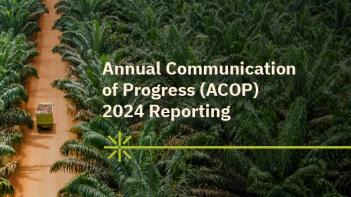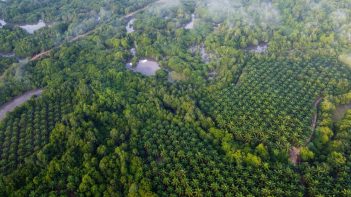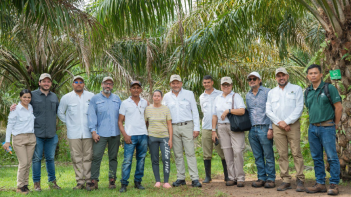Palm oil production has garnered mass attention for its impact on wildlife and natural ecosystems, which can overshadow the importance of social issues, including fair labour laws and labour conditions. What’s equally challenging is that social issues in palm oil production are among the most difficult to identify and audit. As the global demand for palm oil increases, so has the need for large numbers of workers on plantations. This creates pressure on the workforce and an increased risk of labour exploitation, including forced and child labour.
According to the International Labour Organisation, there are 281 million workers living in extreme poverty in emerging and developing countries like China, India, Indonesia, Malaysia and Thailand. In Indonesia alone, there are 16 million workers in the palm oil supply chain, of which 3.78 million are plantation workers. In Malaysia, the second largest palm oil producing country globally, there are 505,972 plantation workers. Ensuring these workers are treated fairly and their rights are upheld is a key priority for the RSPO and our members.
But, how do we ensure that our strict standards are continuously adapting and being implemented on the ground to protect both people and planet?
How do RSPO members protect labour rights?
Labour rights, also known as workers’ rights, are the legal and human rights of workers. Labour and human rights have been a part of the RSPO standards since its inception and are reviewed every five years to ensure the standards remain relevant and continue to address the dynamic challenges and opportunities within the industry. In 2018, the RSPO adopted the 2018 Principles and Criteria (P&C). These address key criteria such as the elimination of deforestation, exploitation, the use of fire, and planting on peatlands.
This iteration also enforces and significantly strengthens the criteria for human and labour rights, including child rights. The enhanced criteria ensures that adequate protection for the rights of workers (and their families) on plantations. Additionaly, these were designed in line with international and local standards including: the SDG principles, UN Guiding Principles on Business and Human Rights (2011), and the ILO Conventions on Forced Labour, Abolition of Forced Labour, Minimum Age, Worst Forms of Child Labour and more.
Another important principle enhanced in the revised 2018 standard is ‘FPIC’, which stands for Free, Prior and Informed Consent. This establishes the basis on which equitable agreements between relevant parties (local communities, companies and in some cases; government) can be created to protect legal and customary rights of indigenous peoples and local communities, while also respecting local rights-holders.
RSPO is the first certification standard to adopt a zero-tolerance policy on threats against Human Rights Defenders (HRD) and to make a commitment to safeguard the confidentiality of those involved. This is accompanied by a HRD hotline for at-risk individuals, available in English, Spanish, French, Bahasa Indonesia and Bahasa Malay.
In June 2019, RSPO launched a first-of-its-kind guidance document for the oil palm industry that creates payment standards known as a ‘Decent Living Wage’, which was adopted from the Global Living Wage Coalition Methodology. This guidance is intended to determine the decent living wage in RSPO-certified units for all workers. We work with members to help them calculate the value of the prevailing wages paid to their workers.
Lastly, RSPO standards guide the development and implementation of standard operating procedures (SOPs) for members to manage their workforce, including rules on workplace protections like Personal Protective Equipment (PPE) and safe working conditions, as well as a commitment to meet or exceed the local national minimum wages.
What about child rights?
Child labour has long been a recognised concern and unfortunately, it has been detected in almost all agriculture sectors. The ILO states that an estimated 152 million children are already in child labour; 72 million are involved in hazardous work; and 7 out of every 10 of these children are working in various agriculture sectors.
The palm oil industry, which is no stranger to controversy, is one of them.
It is imperative for us to realise that child labour does not manifest on its own. No parent would wish for their child to be spending their days on a plantation instead of being in school. There are many factors that contribute to child labour, the main one being income desparity. In order to make systemic changes, the RSPO examines the root issue of social issues that lead to the larger problems and make efforts to treat these problems, not their side effects.
How do RSPO members protect child rights?
RSPO standards require a formal policy for the protection of children, including the prohibition of child labour and that remediation is in place and included into service contracts and supplier agreements. This is backed up by the ILO Tripartite Declaration of Principles concerning multinational enterprises and social policy (MNE Declaration), as well as many national and international laws regarding the elimination of child labour. The standards also require that stricter verifications and age screening processes are employed by the company to safeguard against any risks of child labour.
Members must also assess other elements that may impact both the child and parent(s) to ensure that children are not put in a position where they are forced to be at work. This includes that workers are provided a Decent Living Wage and that adequate education facilities are provided for worker’s children. We have seen our members support their workers by providing childcare facilities, creches and after school care so that parents can comfortably work knowing that their children are safe and protected.
Why is there a need to respect labour rights in the palm oil sector?
The palm oil industry is one of the most significant employers in Malaysia and Indonesia, where 85% of the world’s palm oil is grown. Past NGO Reports have shown that many of the workers on palm oil plantations have been recruited, often with unethical and misleading practices, from vulnerable populations, such as migrant workers, economic refugees or undocumented peoples who have little or no access to legal or political recourse. A lack of documentation of labour conditions as well as plantations being located far away from larger towns puts workers at further risk of exploitation.
Labour rights are important for workers and should be applied globally as it provides focus at the workplace and decent conditions that workers can live and work in. By taking a rights-based approach to implementing our standards, the RSPO hopes to enable its members and ensure they develop systems that will prevent, detect, resolve and monitor any potential exploitation or abuse of workers, which could impact the workforce.
What can you do to support local labour rights?
Choosing RSPO-certified sustainable palm oil is one of the easiest ways to support labour rights and ensure that vulnerable workers are not pushed into unfair labour practices. It is also crucial that we continue to work together to ensure children in oil palm plantations are protected. Look out for the RSPO Trademark (right) on product packaging, search for RSPO members on our website or reach out to your favourite brands to see where they stand on the sustainable sourcing of palm oil and the protection of child and labour rights in palm oil.
You can also participate in the conversation on RSPO’s standards and guidance documents to help strengthen labour and child rights protection and improve compliance with our standards. RSPO frequently calls on members, stakeholders and civil society to provide comments and feedback on these documents through public consultation periods.
Keep reading
Carry Over Credits for Certified Independent Smallholders Group

Latin American Smallholders and Global Brands met in the Peruvian Amazon to Advance Sustainable Palm Oil

From the Amazon to the Aisles: Discovering Sustainable Palm Oil in the Heart of Peru

Global Trends of Sustainable Palm Oil and China's Pathway

Final list of ACOP 2024 Non Submitters

New ISEAL Case Study Identifies Pathways to EUDR Compliance in Palm Oil Sector
Call for Expression of Interest: Nigeria National Interpretation Task Force for 2024 RSPO Principles and Criteria (RSPO P&C) and Independent Smallholder (ISH) Standard

From Cocaine Processing to Cultivating Palm Oil: Resilience takes root in a Colombian community




